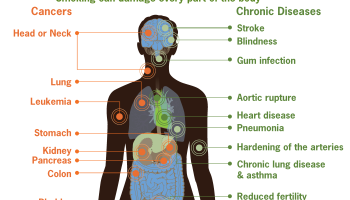Reading Time: 3 minutes
With over 60 known cancer-causing agents and thousands of other harmful chemicals found in tobacco, the consequences of nicotine addiction are hard to avoid for smokers. These harmful substances can have physical and psychological effects on a person that smokes. Nicotine is very addictive, and even when smoking a few cigarettes a month can lead to an addiction.
A booklet produced by the Surgeon General in 2004 mentioned how smoking had cost an estimated 12 million deaths in America since 1964, according to a publication found on the Centers for Disease Control and Prevention website.
What Effects Does a Nicotine Addiction Have on Health?

Smoking nicotine products has many well-known health risks.
Even though people are more aware now than ever before about the dangers of smoking tobacco, it still continues to be a serious problem that produces damaging results. The nicotine in tobacco can be as addictive as other drugs, such as cocaine or morphine. Some effects of a nicotine addiction that lead to heath complications are:
- Cancer – can include cancers of the stomach, pancreas, throat, and kidney.
- Lung cancer – includes other lung diseases such as emphysema, and chronic bronchitis.
- Heart disease – the risk of heart attack or stroke, and other cardiovascular diseases.
- Gum and teeth – can cause gingivitis -an inflammation of the gums and periodontis, which can cause a person to loose their teeth.
- Diabetes – the insulin level can increase, and diabetes type 2 has a chance to develop
- Impotence – men have a risk of having erectile dysfunction
- Pregnancy problems – smoking can make it difficult for a couple to conceive, and can cause low birth and pre-mature birth.
How Does Having a Nicotine Addiction Affect Non-smokers?
Smoking near family members or friends can also put them at risk. Secondhand smoke has caused non-smokers an increase in cardiovascular disease and lung cancer. This can lead to a heart attack and even death.
Children exposed to cigarette smoke are in danger of developing respiratory infections such as bronchitis and pneumonia. In can also cause them to have frequent asthma attacks, more ear infections, and there is also a risk for sudden infant death syndrome (SIDS).
Teenagers are prone to pick up the habit quick, from family or friends. Many think that they will be able to stop within 5 years, but in many cases it has led them to develop a nicotine addiction.
The earlier a young person starts smoking, the more likely they are to become addicted, according to a fact sheet by the Surgeon General.
What Physical and Psychological Effects Does Nicotine Addiction Cause?
Smokers can experience both the physical and psychological consequences of nicotine addiction. The addictive properties of both components create a cycle that continues, increasing the risk of developing debilitating health issues.
Smokers think that a cigarette is needed in order to feel better, think or just relax, this cycle can run through the day. It can also create pattern behaviors and a person will smoke while drinking coffee, after every meal, after having sex, writing, and at other moments to feel calm or even focused. This psychological effect can make this addictive habit hard to quit.
When smoking, nicotine can reach the brain within 10 seconds. This gives the smoker a sudden rush of pleasure, but the feeling doesn’t last very long. To be at that comfort level again, smokers will usually light up another cigarette, and the cycle of nicotine addiction continues. The body develops a tolerance for nicotine, and therefore more nicotine is needed. This physical effect leads to serious health problems.
Knowing how much damage nicotine addiction can cause to smokers and even non-smokers that are around them, quitting is the best decision a person will make. This can be very difficult to do, and it is best to get help from a program especially for people that want to quit, which can provide the support a smoker needs.
